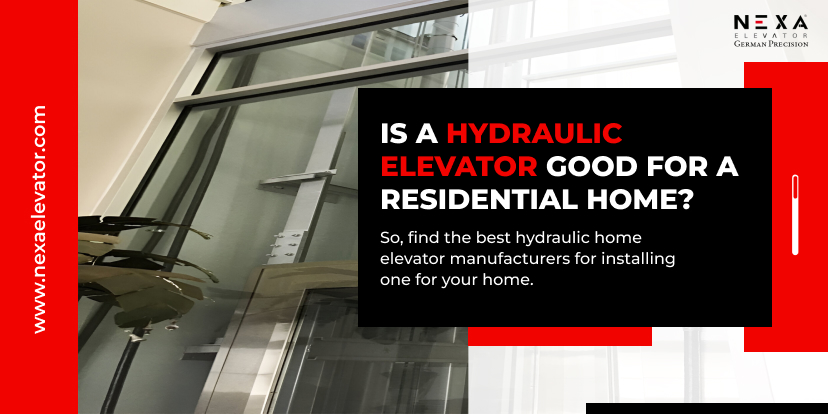
When
any residential developer installs an elevator for a home, they have to
consider some common considerations. Among all the considerations, the primary
factor for elevator installations is the technology that they will use in the
residential home. This depends on the budget for the elevator installations.
Additionally, the installers will consider the design aspect suitable for the
current home planning, design classiness, and colour choice. For many benefits,
they choose hydraulic home elevator
manufacturers for installing hydraulic elevators.
In
this piece of writing, you will get a 360-degree lookout at the hydraulic home
elevator and its benefits, features, pros, cons, and other factors that
homeowners must consider while installing elevators at home. Then, you can
decide to choose them.
What is a Hydraulic Elevator?
A
hydraulic elevator is a specific type of elevator that uses fluid to add
pressure on a piston to lower or raise the elevator body. A hydraulic elevator
runs with the fluid pressure in a barrel that is pressed by a motor or engine,
and then the pressure pumps up into the cylinder. When it comes down, it uses
the pressure of the fluid and gravity. So, the power consumption for the
elevator remains lower than most other elevator technologies used for elevator
manufacturing.
Another
benefit of hydraulic elevators is that they do not require overhead space for
installing machinery there. So, the elevator becomes more compact and flexible
in terms of space requirements. So, find the best hydraulic home elevator manufacturers
for installing one for your home.
Benefits of Hydraulic Elevators for Residential Homes
Here
are a bunch of benefits for installing hydraulic elevators at home. Low-rise
and high-rise homes work well with this elevator technology. Let’s learn some
benefits of hydraulic elevators.
1. No overhead area coverage
These
elevators require less space as the overhead area is not required for
installing a hydraulic elevator. Usually, different kinds of elevator machinery
are installed there to move the elevator body from upwards and downwards. The
pump and cylinder are located in the small machine room in the basement area.
This type of elevator is best for homes where there is less space for elevator
installation and space is more important to prepare the apartments properly.
2. Cost for elevator
installation
Compared
to other elevator technology, this type of elevator requires less capital
investment. Usually, traction or vacuum elevators require a few times higher
investment in comparison with hydraulic elevators. This cost-effectiveness
makes hydraulic elevators an appealing choice for homeowners who want a
practical solution without a massive investment.
3. Smooth Ride Experience
Hydraulic
elevators move with the hydraulic pressure and the movement of a piston that
pushes the cabinet of the elevator. The process is smooth and comfortable. The
noise production is almost nothing. Therefore, a residential elevator is best
with this technology. This hydraulic system minimizes the moving vibration,
landing and starting vibration, and so on. So, the noise neither disturbs the
passengers of the elevator nor the residents of the adjacent rooms. The elderly
and patients who are sensitive to sound may feel relaxed and comfortable during
the elevator movement. The increased load capacity allows for flexibility and
convenience, especially in multi-story buildings.
4. Flexibility in Design
According
to the demand of the building area, design, and budget, the design of the
elevator can be made flexible and attractive. Starting from the traditional
designs, you can give it a modern shape. Homeowners have the opportunity to
choose their desired material, colour, design, and functionality. When you hire
the top customized elevator
manufacturers in the area, you will surely get a budget-friendly,
attractive design by preparing it with imported components, especially from
Germany and the Netherlands.
5. Supports Indian Standards
The
Indian Standardization Authority supports quality installations and hydraulic
elevators to achieve their easy certification. However, the installers’
capability matters most. If the installation process is not right, the
component is not certified, and if the stallion does not comply with Indian
standardization (IS), the elevator will not be allowed in any building. So,
hire the Hydraulic Home Elevator
Manufacturers that have ISO 9001:2015 certification (quality
assurance), and that have imported components for elevator installations.
Are there any drawbacks to hydraulic elevators?
Every
good thing has its drawbacks and vice versa. Hence, it also has some slight
drawbacks. It runs a bit slower and requires maintenance. You have to be
careful not to leak the fluid, which can be harmful to Mother Earth. Besides,
you have to keep the pit area to run the entire pumping system. Having all such
drawbacks, hydraulic elevators have a lot of benefits, which millions of
elevator installers in India like.
At
the end of the discussion, we may surely reach the conclusion that when the
elevation is not much higher, you can choose hydraulic elevators. They are
particularly well-suited to homes with fewer floors, where speed is less of a
priority, and in cases where customization is desired to blend with home décor.
For a smooth ride, you can choose this elevator from Nexa Elevator. It is the
most renowned certified elevator installation company in southern India,
Karnataka. Contact them to install a wide variety of residential and commercial
elevators. They are the top customised
elevator manufacturers there. Contact them now.